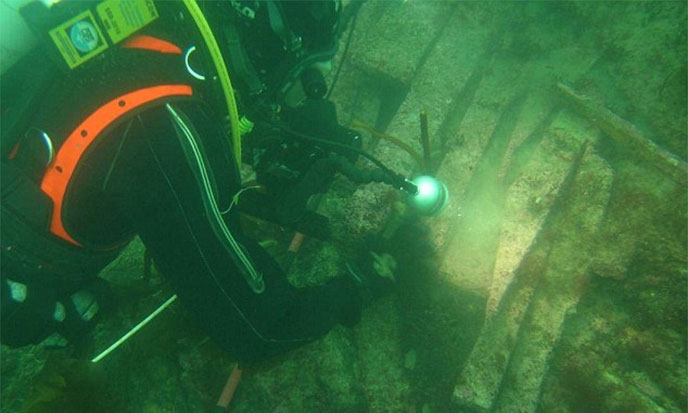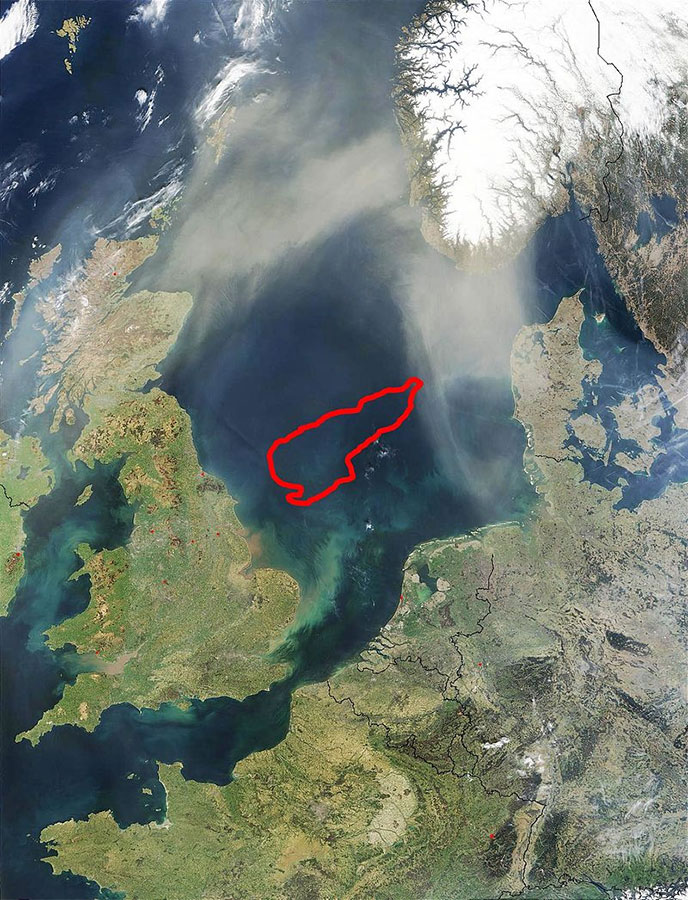
New-Atlantis was found at bottom of North sea – a huge undersea world swallowed by the sea in 6500 BC. Divers have found traces of ancient land swallowed by waves 8500 years ago.
Described as the ‘real heartland’ of Europe, “Doggerland” once stretched from Scotland to Denmark. Rivers have been seen underwater by seismic scans. Britain was not an island – and area under North Sea was roamed by mammoths and other giant animals, and had population of tens of thousands – before being devastated by sea level rises. ‘Britain’s Atlantis‘ – a hidden underwater world swallowed by the North Sea – has been discovered by divers working with science teams from the University of St Andrews.
Doggerland, also called Middle Earth, is a huge area of dry land that stretched from Scotland to Denmark was slowly submerged by water between 18,000 BC and 5,500 BC. Divers found the remains of a sunken world with a population of tens of thousands of souls – which could well have been the true heart of Europe, indeed of the world, in that distant time that textbooks do not mention. A team of climatologists, geophysicists and archaeologists mapped the area using new data collected from oil companies – and revealed the extent of the loss: the fertile and beautiful land, trampled by mammoths and giants tigers, represented a vast territory in the center of a prosperous and developed area.
The research suggests that the populations of these drowned lands could have been tens of thousands, living in an area that stretched from Northern Scotland across to Denmark and down the English Channel as far as the Channel Islands. The area was once the ‘real heartland’ of Europe and was hit by ‘a devastating tsunami‘, the researchers claim.
The wave was part of a larger process that submerged the low-lying area over the course of thousands of years.
‘The name Doggerland was coined for Dogger Bank, but it applies to any of several periods when the North Sea was land,’ says Richard Bates of the University of St Andrews. ‘Around 20,000 years ago, there was a ‘maximum’ – although part of this area would have been covered with ice. When the ice melted, more land was revealed – but the sea level also rose.’

‘Through a lot of new data from oil and gas companies, we’re able to give form to the landscape – and make sense of the mammoths found out there, and the reindeer. We’re able to understand the types of people who were there.
‘People seem to think rising sea levels are a new thing – but it’s a cycle of Earth history that has happened many many times.’
Organised by Dr Richard Bates of the Department of Earth Sciences at St Andrews, the Drowned Landscapes exhibit reveals the human story behind Doggerland, a now submerged area of the North Sea that was once larger than many modern European countries.
Using a combination of geophysical modelling of data obtained from oil and gas companies and direct evidence from material recovered from the seafloor, the research team was able to build up a reconstruction of the lost land. The research project is a collaboration between St Andrews and the Universities of Aberdeen, Birmingham, Dundee and Wales Trinity St David. Rediscovering the land through pioneering scientific research, the research reveals a story of a dramatic past that featured massive climate change.
‘We have speculated for years on the lost land’s existence from bones dredged by fishermen all over the North Sea, but it’s only since working with oil companies in the last few years that we have been able to re-create what this lost land looked like.
‘When the data was first being processed, I thought it unlikely to give us any useful information, however as more area was covered it revealed a vast and complex landscape.
‘We have now been able to model its flora and fauna, to build up a picture of the ancient people that lived there and begin to understand some of the dramatic events that subsequently changed the land, including the sea rising and a devastating tsunami.’ (source)


